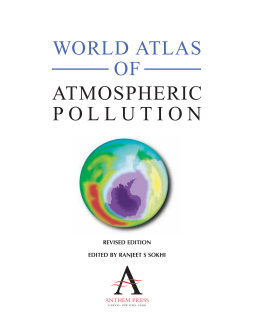
Additional Information
Book Details
Abstract
Air pollution affects us all in a number of crucial ways, causing lasting damage to our health and our environment. While primary pollution can result from local activities, the extent of the impact can be felt at spatial scales from the individual up to the whole planet and temporal scales from minutes to decades. Consequently, pollution of our atmosphere remains a critical concern, warranting continued scientific investigation and the development of effective local and global solutions. ‘The World Atlas of Atmospheric Pollution’ clearly and engagingly summarises current understanding of the state of air pollution on city to global scales.
'A beautifully produced volume which explores diverse aspects of air pollution in the early 21st century in an engaging and visually arresting way.' —Jimi Irwin, ‘Institution of Environmental Sciences’ E-bulletin
Ranjeet S. Sokhi leads the Atmospheric Dynamics and Air Quality Research Programme within the Centre of Atmospheric and Instrumentation Research (CAIR) at the University of Hertfordshire, UK
‘[A] solid primer for readers who want to become more familiar with how air pollution is formed, transformed, and transported as well as gain an understanding of how air pollution effects the environment and public health.’ —Melissa C. Lott, ‘Scientific American’, Plugged In blog
Air pollution affects us all in a number of crucial ways, causing lasting damage to our health and our environment. Whereas primary pollution can result from local activities, the extent of the impact can be felt at spatial scales from the individual up to the whole planet, and temporal scales from minutes to decades. Consequently, pollution of our atmosphere remains a critical concern, warranting continued scientific investigation and the development of effective local and global solutions. ‘The World Atlas of Atmospheric Pollution’ clearly and engagingly summarises current understanding of the state of air pollution on city to global scales.
Using high-quality graphical illustrations, the Atlas begins with a historical perspective before addressing topics such as urban and global air pollution, long-range transmission of pollution, ozone depletion and the impacts of air pollution, as well as future trends. Each chapter provides an introduction to the topic and graphical representations of the spatial and temporal distributions of air pollutants. Wherever possible, the chapters give a world-wide view of the state of our atmosphere. The illustrations are supported by explanations and other background material, allowing the reader to gain an informed insight into emission sources, the resulting atmospheric concentrations of key pollutants and their associated impacts.
Table of Contents
| Section Title | Page | Action | Price |
|---|---|---|---|
| Front Matter | 1 | ||
| Title | 1 | ||
| Copyright\r | 4 | ||
| CONTENTS | 5 | ||
| CONTRIBUTORS | 9 | ||
| FOREWORD | 11 | ||
| PREFACE | 13 | ||
| ACKNOWLEDGEMENTS | 15 | ||
| INTERNATIONAL UNION OF AIR POLLUTION PREVENTION AND ENVIRONMENTAL PROTECTION ASSOCIATIONS (IUAPPA) | 17 | ||
| GLOBAL ATMOSPHERIC POLLUTION FORUM | 19 | ||
| ACRONYMS AND ABBREVIATIONS | 21 | ||
| SELECTED UNITS USED IN ATMOSPHERIC POLLUTION SCIENCE | 23 | ||
| Main Matter | 25 | ||
| INTRODUCTION | 25 | ||
| 1 AIR POLLUTION HISTORY | 31 | ||
| 2 AIR POLLUTION IN URBAN AREAS | 43 | ||
| 3 LONG-RANGE TRANSPORT OFATMOSPHERIC POLLUTANTS AND TRANSBOUNDARY POLLUTION | 59 | ||
| 4 GLOBAL AIR POLLUTION AND CLIMATE CHANGE | 71 | ||
| 5 OZONE DEPLETION | 91 | ||
| 6 ENVIRONMENTAL AND HEALTH IMPACTS OF AIR POLLUTION | 101 | ||
| 7 FUTURE TRENDS IN AIR POLLUTION | 119 | ||
| End Matter | 127 | ||
| REFERENCES | 127 | ||
| LIST OF USEFUL READING MATERIAL | 139 | ||
| INDEX | 141 |
